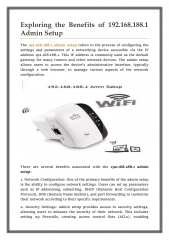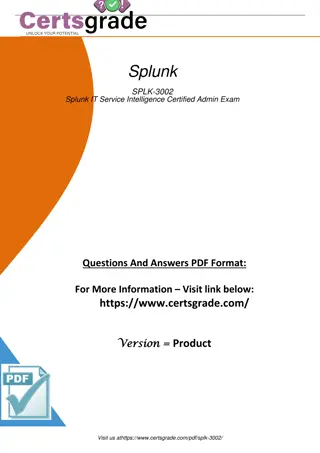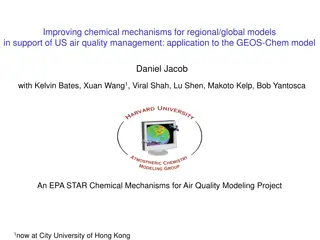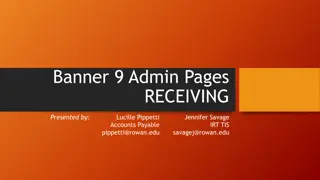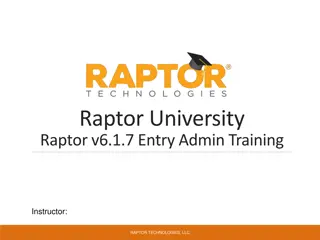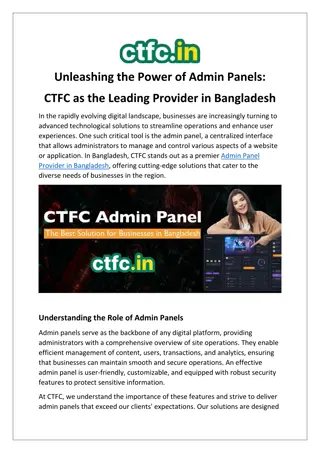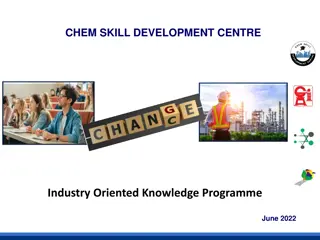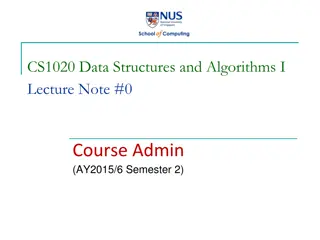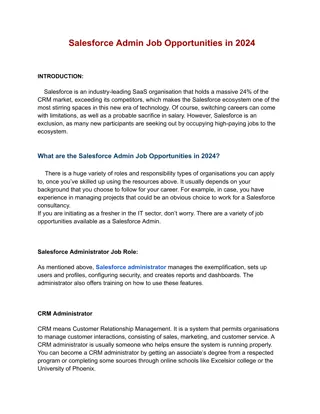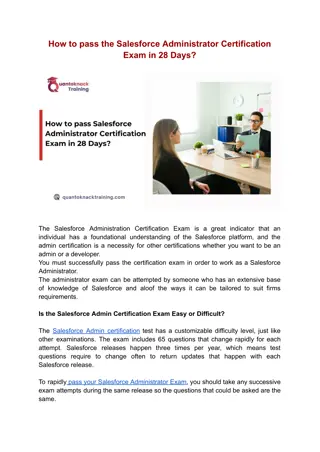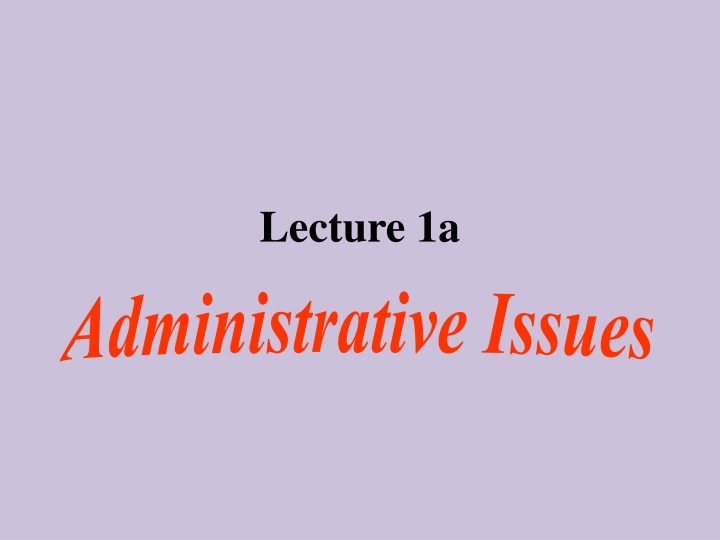
Chemistry Lab Course Overview and Administrative Guidelines
Explore the motivation behind taking chemistry labs, learning goals, and course activities involving experiments such as synthesis of catalysts, Lidocaine, and more. Get insights on administrative issues including arrival time, wait-list accommodation, and enrollment procedures.
Download Presentation

Please find below an Image/Link to download the presentation.
The content on the website is provided AS IS for your information and personal use only. It may not be sold, licensed, or shared on other websites without obtaining consent from the author. If you encounter any issues during the download, it is possible that the publisher has removed the file from their server.
You are allowed to download the files provided on this website for personal or commercial use, subject to the condition that they are used lawfully. All files are the property of their respective owners.
The content on the website is provided AS IS for your information and personal use only. It may not be sold, licensed, or shared on other websites without obtaining consent from the author.
E N D
Presentation Transcript
Lecture 1a Administrative Issues
Motivation Why do students take chemistry labs? Most lecture courses provide a theoretical background in general chemistry and in organic chemistry but usually do not consider the practical aspects of the experiment much Conducting an experiment in lab is often times much more complicated than chemistry conducted on paper because many details have a significant impact on the overall outcome of the experiment Performing an actual experiment in the lab is a learning experience on how to combine many theoretical and practical aspects together (i.e., theory of the reaction, Le Ch telier Principle, polarity, acidity, kinetics, etc.)
Learning Goals At the end of the class you should be able to Be able to perform basic laboratory techniques i.e., setting up and running reactions, perform purifications (extraction, recrystallization, chromatography) Be able to operate equipment used in the lab correctly i.e., infrared and UV-Vis spectrophotometer, rotary evaporator, polarimeter, etc. Analyze spectra and chromatograms of your compounds (IR, NMR, UV-Vis, GC/MS, HPLC) Understand why things happen in the lab Be able to perform literature research and write a report that takes literature results into account in the discussion Be familiar with safety regulations
Course Overview II Experiments and Activities Meeting 1-8: Synthesis of Jacobsen s Catalyst and Chiral Epoxidation of an Unknown Alkene R1 O R2 NH2 HOOC OH + R3 R4 NH2 HOOC OH NaOCl H2O/AcOH R1 R2 NH3+ -OOC R3 R4 OH NH3+ -OOC N O OH N OH 1. Mn(OAc)2*4 H2O 2 K2CO3 Mn Cl 2 Air 3. LiCl OH N O N OH CHO 2
Course Overview III Experiments and Activities Meeting 9-11: Synthesis of Lidocaine Meeting 12-14: Synthesis of Nitrobiphenyls Meeting 15-18: Synthesis of Acetyl ferrocene and Ferrocene derivatives CH3 (CH3CO)2O H3PO4 FeCl2 + 2 K+Cp- O Fe Fe ? -2 KCl
Administrative Issues Make sure that you arrive on time to your first in-lab meeting because if you are more than 15 minutes late, you will lose your spot in the course. Excuses do not count later on i.e., I did not think that the lab meets during meeting 1 or I did not find the lab ! (Hint: Only the elevator in the east wing goes all the way up to the 6thfloor!) Wait-listed students will be accommodated if spaces become available during the first meeting of the section: chemistry> biochemistry> other majors >> extension students, priority in within a group will be given to seniority If the student is added to the roster, the instructor will report the student to the department to been enrolled (usually at the end of the first week and not on the same day!)
Textbooks/Readers The course reader bundle (= main reader (purple) and exam collection (light purple), $36) is mandatory while the Survival Kit reader (=SKR, orange, $29) is highly recommended. All readers are available from Course Reader Materials (1081 Westwood Blvd). It is highly advisable to have the latest version (Winter 2016) because this is the reference for the experiments, the quizzes and the final exam. Recommended: Mohrig et al., Techniques in Organic Chemistry (online: $45.99 for a 180 day subscription for the 4thedition via coursesmart), most students usually have a copy already if they were enrolled in Chem 30BL recently Organic textbook for reference i.e., Brown and Foote, Mc Murry, Wade, Vollhardt and Schore, etc.
Preparation for in-lab meeting Pre-lab: title, purpose, introduction, balanced chemical equations, detailed procedure, safety information of all chemicals used (review the MSDS for each compound used in the experiment), spectroscopic information (Xerox copy if available, if not the numbers will do fine as well), answers to pre-lab questions (posted on course website), a sample pre-lab can be found on page 9 in Survival Kit Reader (=SKR) Consult the appropriate reading assignments to get a better in-depth understanding of the material. It could not hurt to review the techniques used in the project as well before entering the lab Bottom line: The better you understand what you are about to do, the easier it will be in the lab. If you put in the time beforehand, you will be less stressed in the lab. Copying reports from friends or room mates, etc. might safe time, but it will show in the end (=final exam), where many of these students have experienced a Waterloo.
Grades In-lecture quiz (20 points, seven total, schedule to be announced, lowest score dropped) Pre-lab (5 points) and post-lab (5 points, no post-lab questions!) Formal report for epoxidation project (20 points draft (due: January 22, 2016 at 4:30 pm), 60 point final version (due: February 5, 2016 at 4:30 pm) Proposal and oral presentation for Ferrocene project (20 points each) Product evaluations (2*20 points=40 points) TA/Instructor evaluation (10 points per meeting, average student 7-8 points) Lab notebook (20 points, due immediately after final exam) Final Exam (200 points, March 17, 2016, 8:00-11:00 pm), no make-up exam Bottom line: Both the in-lab portion and the final exam have to be passed to pass the course. In order to get a high grade in the course, the student has to perform very well in both portions, not just in one portion.
Instructor Office: Young Hall 3077E Office hours: MWF 10-11 am, M 3-4 pm and TR 11-12 pm in YH 3077 or by appointment (please do not schedule an appointment before 8 am or after 4:30 pm, if you do make an appointment, make sure to show up on time!) Email: bacher@chem.ucla.edu Course website: www.chem.ucla.edu/~bacher (Note that the instructor does not use the CCLE website!) Course discussion board: www.piazza.com/ucla/winter2016/chem30cl The course discussion board has to be used for general chemistry questions only. This means that you cannot post homework questions! Sign up for Scifinder before the first in-lab meeting


